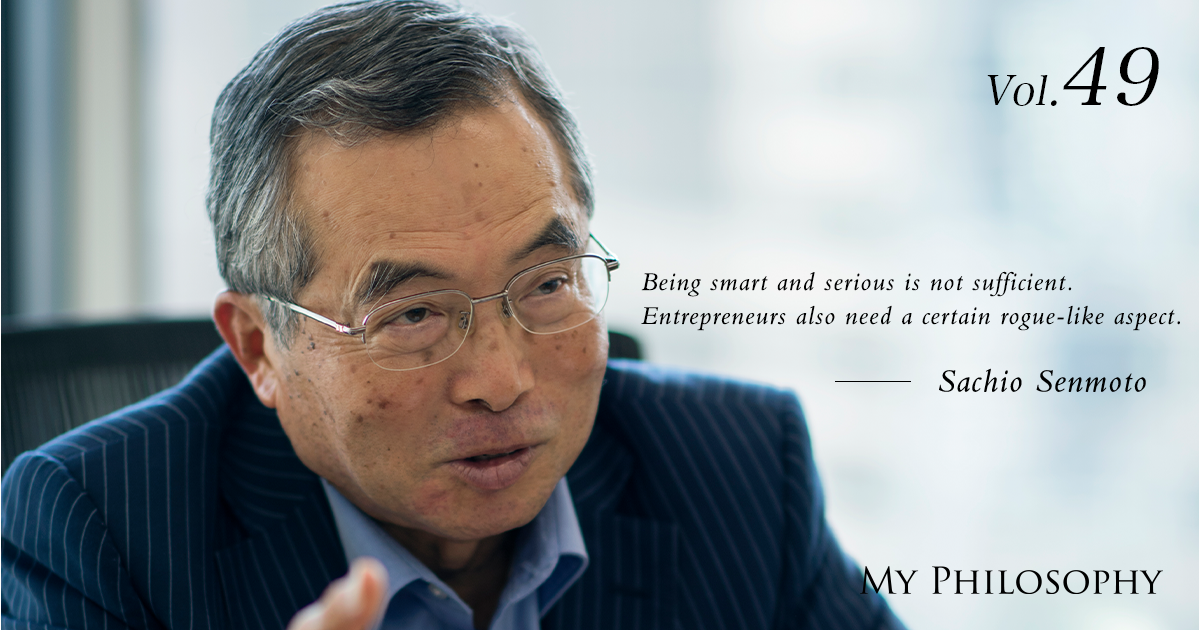
Sachio Senmoto, who has always been ahead of the times by founding companies such as DDI, eAccess, and eMobile, shared his profound insights and the essence of venture management with young entrepreneurs.
Profile
Vol.49 Sachio Senmoto
Chairman of the Board, Renova, Inc.
Born in Nara Prefecture in 1942, Sachio Senmoto graduated from the Department of Electronic Engineering, Faculty of Engineering at Kyoto University. He completed both his Master's and Doctoral programs at the University of Florida, earning a Ph.D. in Engineering. After graduating from university, he joined Nippon Telegraph and Telephone Public Corporation (now NTT).
At the age of 42, he resigned in protest against NTT's monopolistic control over communications. In 1984, together with Kazuo Inamori, then president of Kyocera, DDI Corporation (now KDDI). He went on to found eAccess in 1999 and eMobile in 2005. In March 2014, he retired from his position as Honorary Chairman of eAccess, and in April of the same year, he was appointed External Director of Renova, Inc.
He assumed his current position in August 2015.Throughout his career, he has held various academic positions, including Visiting Professor at Carnegie Mellon University in 1992, Professor at Keio University’s Graduate School of Business Administration in 1996, Visiting Fellow at Stanford University in 1997, Visiting Professor at the University of California, Berkeley in 2001, and Visiting Professor at the University of Canterbury in 2006.
His notable publications include "The Transformation of 'Worthwhileness': What Genuine Human Strengths Enhance Oneself (“Yarigai” no Henkaku – Jibun wo Takameru Honmono no Ningen ryoku towa) (Seishun Publishing) ", "Sachio Senmoto's MBA: How to Create a Company - Know-how for New Business Success (Senomoto Sachio no MBAshiki Kaisha no Tsukuri kata – Shin Business Seikou no Knowhow) (PHP Institute), and "Challenging Management: Sachio Senmoto's Philosophy of Entrepreneurship (Chosen suru Keiei – Senmoto Sachio no Kigyo Tetsugaku) (Keizaikai), among many others.
*Titles and positions are as of the time of the interview (August 2016).
Breaking New Ground

Top companies leading the era, such as Google and Tesla Motors in Silicon Valley, are all focusing on renewable energy. They are actively investing in the installation of power generation facilities and the development of batteries for renewable energy. Japan needs to thoroughly study and understand these global trends. Denmark, with a population of about 5.7 million, has produced DONG Energy, the world’s largest offshore wind power company. Japan, with a population of approximately 120 million, is finally starting to establish its market and is trying to catch up with the US and Europe, albeit belatedly. However, compared to India and China, Japan still lags behind.
The reason Japan is behind in this field is due to the lack of regulatory policies and the strong influence of existing power companies. The telecommunications sector was liberalized, leading to the creation of DDI (now KDDI), but power companies are more conservative than NTT. Currently, many of the companies engaged in large-scale renewable energy projects in Japan are trading and financial companies, rather than the business enterprises that should be involved. Renova, Inc. is breaking new ground in this area. It is an entirely independent company, not under the umbrella of major financial or power companies, established by extremely talented former McKinsey employees, and it maintains a leading position in this field.
Vision for the Times

Elites often see too much of everything. Beyond being smart, one needs a certain kind of audacity, or they risk remaining a small group forever. Renova drastically changed within a year after I instilled a sense of passionate audacity. My former secretary, who was with the president, remarked, “Mr. Senmoto, it’s amazing to see a company change this much!” I infused my philosophy into every aspect, turning Renova into a passionate corporate group. While I speak of audacity, it must be balanced with seriousness. Diligently preparing three times more than others is essential, and at some point, one must take a leap. This leap can significantly alter one’s life. Had I stayed with NTT, I would be living a pensioner’s life with nothing to do but fishing.
When I left NTT in 1983, before its privatization, it was like setting off in a small boat amidst a dark, stormy gale. Defying a giant monopoly with 330,000 employees to start a telecommunications company faced tremendous opposition. I even feared for my life, avoiding walking near the edge of train platforms. Today, calls via LINE are free, but back then, a three-minute call between Tokyo and Osaka cost 400 yen, and a 30-minute call cost 4,000 yen. I wanted to create DDI to revolutionize the telephone business and break new ground. After the telephone revolution, I foresaw the internet becoming the major storm of the 21st century, leading me to found eAccess. Revolutionizing telephony, then the internet, and now energy. Those who cannot see the world’s major trends can only create small ventures, not large ones. Thus, it is crucial to have the vision to see the significant trends of each era.
First-Class Management Team

In any organization, the key is how to build a top-notch management team. There is only so much a CEO can accomplish alone. When I founded DDI, I had Kazuo Inamori by my side. During the establishment of eAccess, I had Eric Gan. Eric was an outstanding CFO who could interpret everything from financial statements and possessed many qualities that I did not. Genius venture entrepreneurs often believe they are omnipotent and can do everything by themselves. However, just like the management team that perfectly combined my business vision and ability to read the times with other essential qualities, a first-class team is necessary for successful management.
In recent years, I feel Japan has been changing. For instance, interesting ventures such as FinTech companies and Money Forward have emerged, and they are very solidly founded. Fintech is likely to trigger a financial revolution. Moreover, there is a company called WealthNavi, established by an elite who left the Ministry of Finance. In the past, it was common for individuals to spend their entire careers at the Ministry of Finance and then retire to some position in a small or medium-sized enterprise. However, I find it encouraging that there are now young people in their 30s who leave the ministry and take the bold step of charting their own path,demonstrating remarkable preparation.
Sharing Experience and Intelligence with Young Entrepreneurs

Having experienced being a founder and CEO, and now at 70 years old serving as Chairman of the Board, the view from this position is entirely different. I am constantly thinking about how to support young entrepreneurs so they can perform at 120% of their capabilities. In the past, I used to get angry frequently, but now I almost never do. My perspective has shifted to focus on how to motivate and elevate everyone.
Starting from scratch, I have always navigated small boats through storms, turning them into large ships. I have faced various disasters and endured many hardships. Because of this journey, I am able to provide advice that is rooted in experience, and I can see where Renova is currently positioned on the map. Young entrepreneurs are running with all their might, often only able to see what’s directly in front of them. They lack the experience and intelligence that I have accumulated. My role is to fill in those gaps, elevate their level, and enhance their capabilities.
This interview was truly enjoyable. The series “My Philosophy,” which started with the aim of seeking guidance from seniors during the early days of their entrepreneurial journey, has now reached its 49th installment. I can say that the teachings of past guests have been creatively applied in Mr. Sugiyama’s own way, leading to actions that have served as a catalyst for growth.
There are only three types of people.
Those who don’t understand what is happening in the world. (People who cannot grasp the current situation)
Those who are smart, can see, understand, and analyze what is changing. (People who can grasp the current situation but cannot take action)
The 1% who, based on the understanding of type 2, take action to make things happen. (People who can grasp the current situation and take action)
And above all, those who can continue to do so consistently.
With top-class action and communication skills in Japan, business producer DK Sugiyama’s future endeavors are something to look forward to.
Sachio Senmoto,Chairman of the Board, Renova, Inc.
It was truly a remarkable decision made by Mr. Senmoto when he left NTT at the age of 42, challenging its monopolistic control over communications. His powerful words, stemming not from theory, ideas, or armchair discussions but from real-world business experience, resonated strongly. His proactive attitude, moving forward rather than waiting, is the key point of “courage to act.” Age does not matter when it comes to taking action. I aspire to emulate Mr. Senmoto’s determination, stamina, and perseverance, placing himself in challenging environments and striving to rise from them.
August 2016 at Renova, Inc.Translated by ILI Inc.



































































































































